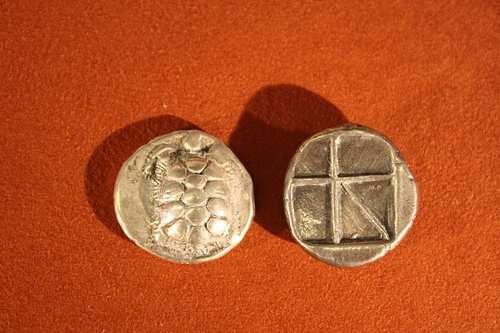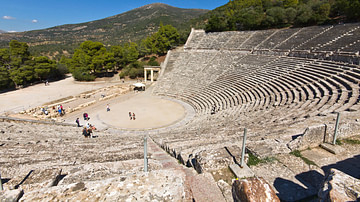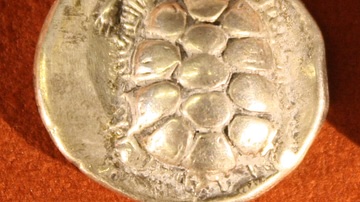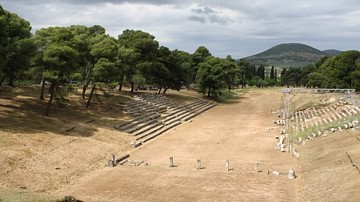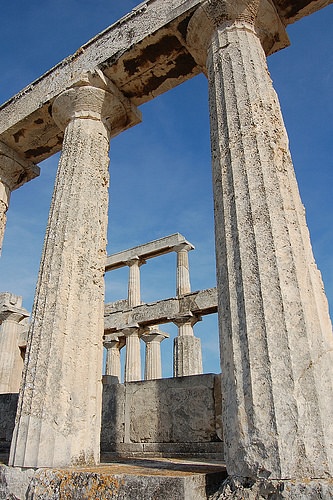
Aegina is an island in the Saronic Gulf, south of Athens. It was one of Greece's early maritime powers, famous for minting the earliest coins in Greece which were accepted all over the Mediterranean region. According to the classical writer Ovid (43 BCE - 17 CE), the island was originally known as Oenone. As the myth explains, the god Zeus, in the shape of a great flame, carried off the nymph Aegina and kept her on the island. In time, she gave birth to a son, Aeacus, who renamed the island after his mother.
A Prosperous City
According to Herodotus, Aegina was a colony of the city of Epidaurus, a prosperous cult center for the demigod Asclepius, located on the coast of the Peloponnese. This city was an important Mycenaen stronghold, and artifacts discovered on Aegina have established that the Mycenaen culture survived on the island long after the Doric Invasion of c. 1200 BCE which supplanted it.
The wealth of Epidaurus seems to have been put to good use by the citizens of Aegina in that the island flourished early on and, in time, came to rival Athens. The standard of weights and measures developed by Aegina became the standard all over Greece, they were the first to mint coins, and their fleet of ships carried on trade throughout the Mediterranean and the Aegean all the way to Egypt and the Persian Levant. While Herodotus (c. 484 – 425/413 BCE) claims that Athens and Aegina became enemies over a feud involving statues of two deities, it is more likely that the mainland city grew envious of the island city's prosperity and, further, concerned over their trade with Persia.
Foreign Affairs
The Ionian Greek colonies in Asia Minor, under Persian control, had been a source of conflict for the Persian Empire for years. After the Ionian Revolt of 499-493 BCE, in which the Greek colonies were defeated by the Persian forces and order restored, Aegina, which had not been involved in the conflict, sent Persia symbols of submission which amounted to a pact in the eyes of Athens. The Athenians had supported the Ionian Revolt (along with the city of Eretria) as far as supplying troops and arms to the colonies. Aegina's gesture of goodwill toward Athens' enemy would not have been taken well. In retaliation for Greek support of the Ionian Revolt, Darius I of Persia (c. 550-486 BCE) invaded Greece in 490 BCE but was beaten back at The Battle of Marathon.
Ten years later, Darius' son, Xerxes I (r. 486-465 BCE), invaded Greece to complete what his father had begun. After a series of battles (including the famous Battle of Thermopylae), he was defeated at the Battle of Salamis in 480 BCE by the combined naval forces of Athens and Aegina. As there is no evidence of warm relations between Athens and Aegina, nor any evidence of a breakdown in relations between Aegina and Persia between the pact in 491 BCE and the Battle of Salamis, it would seem as though Aegina was forced to fight against the Persians in the patriotic aftermath of Thermopylae. Whatever their motivation was, Aegina's ships played a crucial role in the destruction of the Persian fleet. Following this, however, Aegina fell under the shadow of Athenian naval and commercial supremacy and began to decline.
Decline
Aegina fought against Athens in the First Peloponnesian War (460-445 BCE) where they were probably backed by the Persians who not only protected their trade interests but also supported the enemy of their enemy (Athens). With or without Persian support, however, Aegina's time of greatness was over. By the time Plato wrote his dialogue of the Phaedo (c.380-360 BCE) Aegina was considered little more than a pleasure resort. In the dialogue, when Echecrates asks Phaedo, "But Aristippus and Cleombrotus, were they present?" Phaedo answers, "No, they were not. They were said to be in Aegina." Aristippus was the founder of the Cyrenaic school of philosophy, which taught that pleasure is the only intrinsic good, and an informed ancient reader of Plato's dialogue would have understood these lines as a kind of `inside joke' equating the Cyrenaic's hedonism with the island of Aegina.
